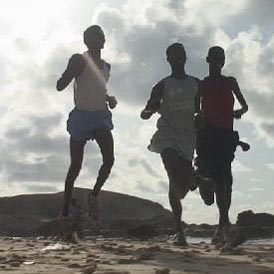Somalia: racing against all the odds
Every time Abdinasir Ibrahim pulls on his running shoes, he risks his life. In Somalia, training for the Olympics is a dangerous business, as Jamal Osman discovered.
In an exclusive report for Channel 4 News, Osman has travelled to Mogadishu to meet the athletes who run daily along the “road of death” through the city, aware that at any time they could be shot by rebel gunmen or nervous security forces.
Somalia has been devastated by two decades of war, with African Union forces from Uganda and Burundi helping protect a weak government, under attack from al-Shabab – a pro-al-Qaeda Islamist group who use suicide bombers and snipers as their main weapons.
“The conflict between militiamen loyal to al-Shabab and those loyal to the government is causing a problem,” says Abninasir Ibrahim, in a masterly piece of under-statement. “Both groups are Somalis and I would love them to be united to save future generations.”
Abdinasir – a 5,000 metre runner who competed in the Beijing Olympics – knows only too well the dangers of the civil war. His mother and two of his brothers are among those who have been killed in the fighting.

“My wife was just at home when gunmen broke into the house and shot her dead,” says his father, Said Ibrahim. “They looted our belongings and left. She left six children behind – Abdinasir was the second youngest. A few years later, two of my other sons were also killed.”
Olympic spirit
But Abdinasir’s spirit and determination to compete in next year’s London Olympics typifies that of Somalia’s dwindling band of surviving sportsmen.
“When the civil war started, most of the athletes fled, others got injured because of the conflict,” says Ahmed Ali, the untrained volunteer who acts as coach to the national team. “One of them was shot in the back and paralysed.
“We have faced so many difficulties. Athletes without morale. Our federation doesn’t give financial support – just a moral one. Because the whole country has no money.”
The European 5,000 metre champion, Mo Farah, was born in Somalia but moved to Britain when he was just eight years old.
He met Abdinasir at the 2008 Beijing Olympics, giving him a pair of his running spikes and receiving in return the advice: "We have nothing. You have everything. You could be running faster."
In an interview with Channel 4 News, Farah admits to being "fired up" by his talk with Abdinasir.
"He said there was still a war going on - and he was training," said Farah. "When I heard the story in person I was shocked. I thought 'Oh my God, how can somebody still run when you can hear gunshots?'
"In the situation where he is and where I am, I am very lucky to have what I have."
To get to the dusty sports ground the athletes use for their training, they have to jog along the main road through Mogadishu, past roadblocks of armed militia and military checkpoints, where suicide bombers are common and where dozens of civilians have been shot and killed.
Filming the athletes on their early morning run to the sports ground, Jamal Osman saw at first hand how dangerous it could be.
“The athletes started their usual run along the main road and sprinted past a group of nervous militiamen sat by a wall,” he reports. “Fearing a suicide attack, a man raised his AK47 rifle.
“It was a terrifying moment. I genuinely thought they were going to be shot.” Jamal Osman
“Then I heard shouting – ‘we’re sportsmen, we’re sportsmen’ – and the sound of a rifle being cocked. I threw my camera down. It was a terrifying moment. I genuinely thought they were going to be shot.”
Even at their training ground, under police supervision, it is not safe – one sportsman was killed when a suicide bomber blew himself up at the gates to the compound. Government forces use it for summary executions. But it is all the athletes have.
Abdinasir took Jamal Osman to the former National Athletic and Football Stadium in Mogadishu, built to host international competitions, but located in the middle of the war zone and left in ruins by the fighting that has gone on around – and through it.
Bomb attack
The VIP area was destroyed in a bomb attack on the Somali Prime Minister six years ago, in which 15 people were killed. Bullet cases litter the running track. But a dugout still stands, where – seven years ago – a 14-year-old Abdinasir scrawled a message, which survives to this day: “I love winning and one day I WILL be world champion”.
“He loves sport and is a natural winner,” says his father. “He works very hard and is determined to achieve success. If he gets the support he needs, he will be the best in the world.”
Abdinasir finished last in his 5,000 metre heat at the Beijing Olympics, but he is proud of what he has already achieved – and determined to do even better.
“I realised in Beijing that our athletes were more important than our leaders, famous people or politicians,” he says. “They were not expecting to see athletes from Somalia. People from all over the world congratulated us for just taking part, but we wanted to represent out country.
“If all goes well, I would like to come to London, carrying the whole Somali nation on my shoulders. I’m hoping to be a medal winner – a world champion.”